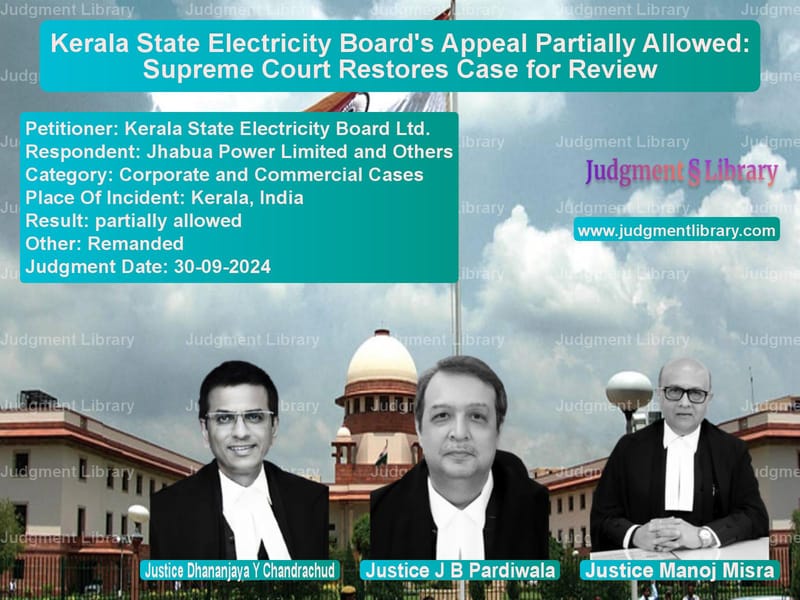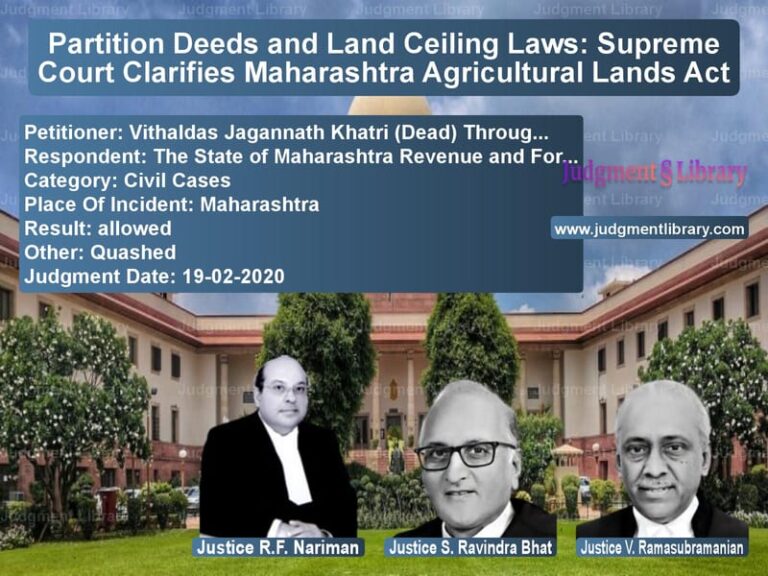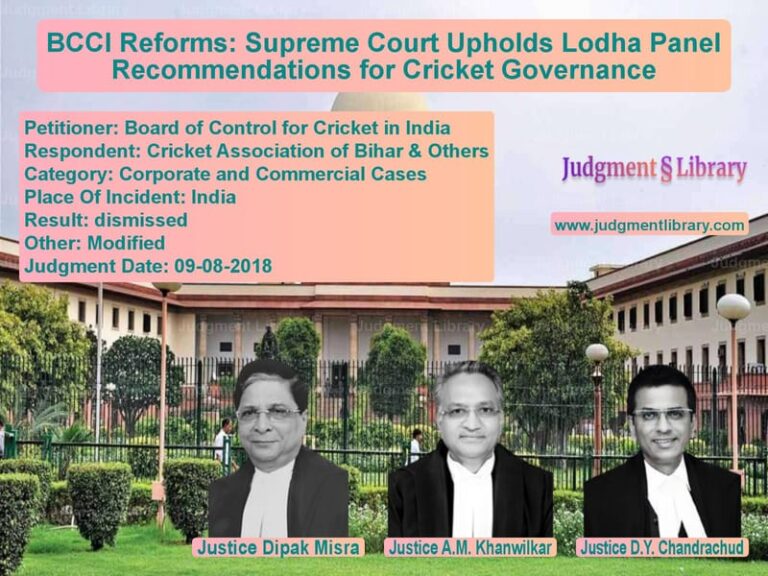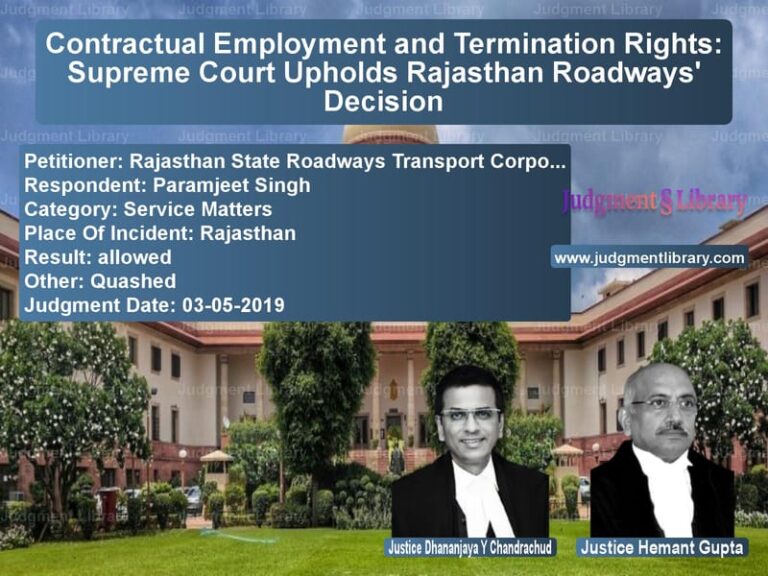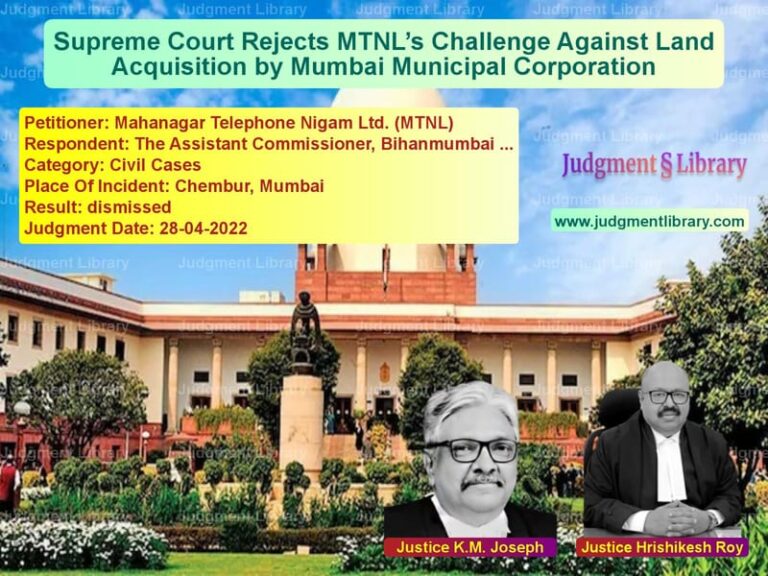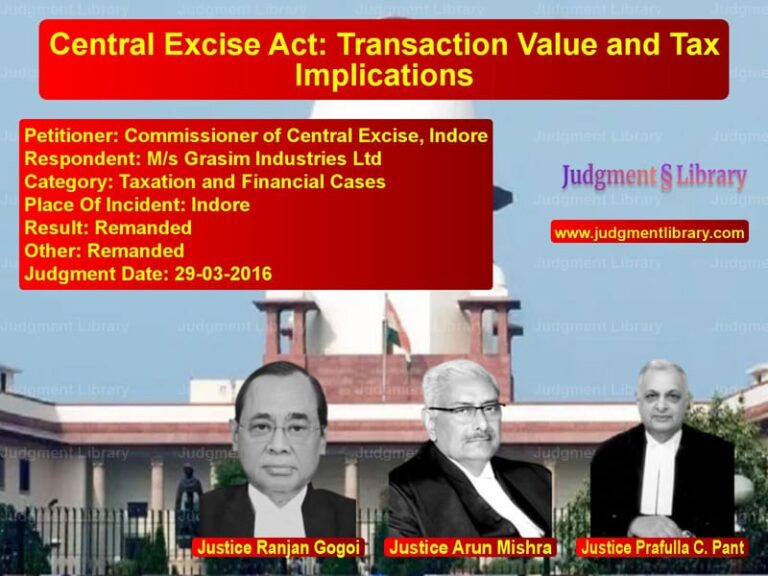Kerala State Electricity Board’s Appeal Partially Allowed: Supreme Court Restores Case for Review
The legal dispute between Kerala State Electricity Board Ltd. (KSEB) and Jhabua Power Limited & Others revolved around the procurement of power through a competitive bidding process. The Supreme Court, in its judgment dated September 30, 2024, ruled on the procedural irregularities in the approval of power supply agreements (PSAs) and the extent to which state government directives influence the Electricity Regulatory Commission’s decisions.
The ruling has significant implications for the governance of the electricity sector, particularly concerning the autonomy of regulatory bodies and adherence to standard bidding processes.
Background of the Case
The Kerala State Electricity Board Ltd. (KSEB) floated two tenders for power procurement under Section 63 of the Electricity Act, 2003. These tenders aimed to procure:
- 450 MW of power (First Bid)
- 400 MW of power (Second Bid)
Following the bidding process, the L1 bidders (lowest bidders) were identified for each tender. However, these bidders did not bid for the entire quantum:
- The L1 bidder in the first bid offered only 200 MW (out of 450 MW).
- The L1 bidder in the second bid offered only 100 MW (out of 400 MW).
KSEB invited other bidders to match the lowest quoted tariff for the remaining quantum, leading to varying responses:
- For the first bid, only the L2 bidder agreed to supply 115 MW.
- For the second bid, bidders from L2 to L5 agreed to match the L1 bidder’s tariff, leading to a procurement of 550 MW, exceeding the initial 400 MW requirement.
Regulatory Challenges
Following the finalization of these power supply agreements (PSAs), the Kerala State Electricity Regulatory Commission (KSERC) was approached for approval. However, the KSERC observed several issues:
- The bidding process had deviated from the standard guidelines issued by the Ministry of Power.
- No prior approval was sought from the KSERC or the Central Government regarding these deviations.
- Due to these irregularities, the KSERC approved the PSAs with the L1 bidders but deferred approval for the remaining agreements.
Subsequent Developments
Despite the regulatory concerns, KSEB continued procuring power under the disputed PSAs until 2023. In 2020, KSEB requested approval for fuel surcharge rates, but KSERC refused, citing non-approval of the PSAs.
After a prolonged legal battle, the KSERC, in its May 10, 2023 order, declined to approve the remaining PSAs, citing lack of transparency and deviation from the standard bidding process. The KSERC further held that the deviations were against public interest and could cause long-term financial burdens for consumers.
Government Intervention and Review
In October 2023, the Government of Kerala invoked Section 108 of the Electricity Act to issue policy directives, emphasizing the public interest in approving the PSAs. The government argued that rejecting these agreements would force KSEB to procure power at higher rates, passing additional costs onto consumers.
Following this directive, KSEB withdrew its appeal before the Appellate Tribunal for Electricity (APTEL) and filed a review petition with KSERC, which was granted on December 29, 2023. The KSERC, citing government directives, approved the disputed PSAs.
Appeal Before APTEL
Two power generators, Jhabua Power Limited and Jindal India Power Thermal Limited, challenged the KSERC’s decision before APTEL. Their arguments included:
- The KSERC had exceeded its jurisdiction by approving the PSAs based solely on state government directives.
- The review petition was invalid as it did not meet the threshold for review under Order XLVII Rule 1 of the Civil Procedure Code.
- The state government could not interfere in the KSERC’s quasi-judicial functions through policy directives.
On July 26, 2024, APTEL ruled in favor of the power generators, setting aside KSERC’s approval of the PSAs.
Supreme Court’s Observations
The Supreme Court, comprising Chief Justice Dhananjaya Y Chandrachud and Justices J B Pardiwala and Manoj Misra, examined two primary issues:
1. Government Directives and Regulatory Autonomy
- The court reaffirmed that regulatory commissions must operate independently of state government policy directives.
- Policy directives under Section 108 of the Electricity Act should only “guide” the regulatory body but cannot force specific decisions.
- The KSERC had erred in overturning its own order solely based on the state government’s directive.
2. Scope of Review Jurisdiction
- Review petitions must meet strict criteria, such as the discovery of new evidence or a clear legal error.
- KSERC had not identified any errors in its previous order but had merely relied on government policy, making its review decision invalid.
Final Judgment
The Supreme Court ruled:
- APTEL’s decision to set aside KSERC’s approval of the PSAs was justified.
- The appeal against KSERC’s May 10, 2023 order would be restored before APTEL for reconsideration.
- APTEL must now examine any remaining legal issues raised before the withdrawal of the original appeal.
Implications of the Judgment
The ruling has major implications for the electricity sector:
- Regulatory Independence: The judgment reinforces that electricity regulators cannot be forced to approve agreements based on government policy.
- Bidding Transparency: Power procurement must strictly follow competitive bidding guidelines to ensure fairness.
- Judicial Oversight: Courts will intervene if regulatory bodies overturn decisions without proper justification.
This case highlights the balance between regulatory autonomy and government policy, ensuring that consumers are protected from arbitrary financial burdens while maintaining transparency in power procurement.
Petitioner Name: Kerala State Electricity Board Ltd..Respondent Name: Jhabua Power Limited and Others.Judgment By: Justice Dhananjaya Y Chandrachud, Justice J B Pardiwala, Justice Manoj Misra.Place Of Incident: Kerala, India.Judgment Date: 30-09-2024.
Don’t miss out on the full details! Download the complete judgment in PDF format below and gain valuable insights instantly!
Download Judgment: kerala-state-electri-vs-jhabua-power-limited-supreme-court-of-india-judgment-dated-30-09-2024.pdf
Directly Download Judgment: Directly download this Judgment
See all petitions in Company Law
See all petitions in Corporate Compliance
See all petitions in Public Interest Litigation
See all petitions in Judgment by Dhananjaya Y Chandrachud
See all petitions in Judgment by J.B. Pardiwala
See all petitions in Judgment by Manoj Misra
See all petitions in partially allowed
See all petitions in Remanded
See all petitions in supreme court of India judgments September 2024
See all petitions in 2024 judgments
See all posts in Corporate and Commercial Cases Category
See all allowed petitions in Corporate and Commercial Cases Category
See all Dismissed petitions in Corporate and Commercial Cases Category
See all partially allowed petitions in Corporate and Commercial Cases Category

